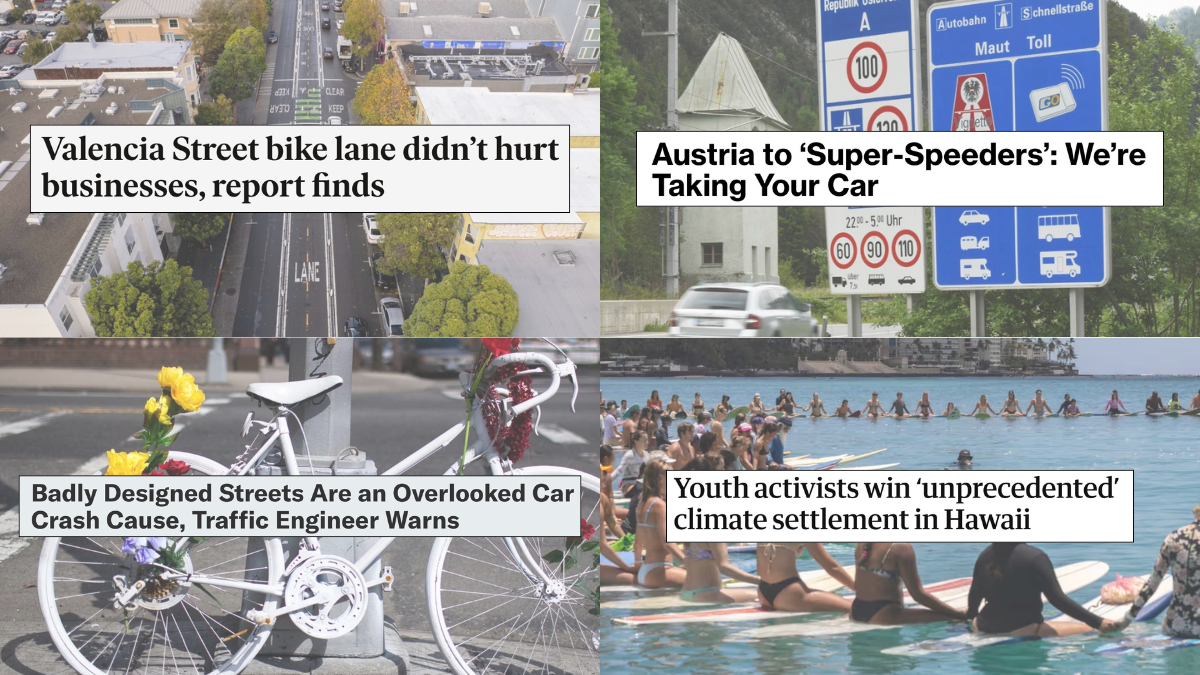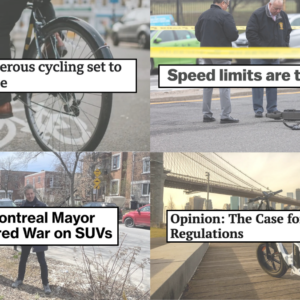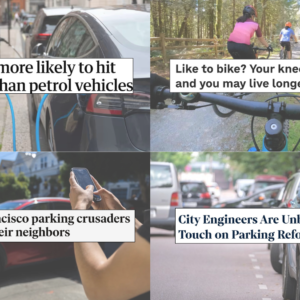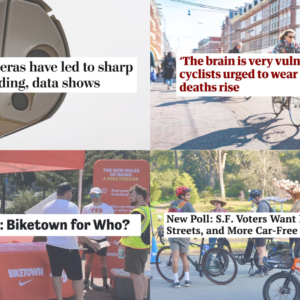Welcome to the week.
Let’s start things off with a recap of the best stories our community came across in the past seven days…
This weeks’ roundup is sponsored by River City E-Bikes,
who invites you to their first-ever E-Bike Open House event on June 29th.
Could it be?: It’s fun to go down the rabbit hole of whether or not an electric bike is actually better for the earth than a conventional bike. This writer thinks so and it’s based largely on food consumption and energy used. (Cycling Electric)
Transportation decarbonization: Youth plaintiffs in Hawaii scored a major win in a lawsuit against their state DOT, who they say isn’t doing enough to reduce carbon emissions that jeopardize their future existence. (The Guardian)
Engineering profession in the hot seat: Another week, another chance for “Killed by a Traffic Engineer” author Welsey Marshall to blow the whistle on why some traffic engineers implement designs that are inherently unsafe. (Scientific American)
Horrific crash caught on video: A man driving a Subaru was allegedly drunk when he plowed directly into a group of people riding bicycles. He was later arrested, but not before video of the incident went viral. (NBC DFW)
Bus enforcement: What if a bus could automatically cite drivers who block bus lanes? We don’t have to wonder anymore because a pilot with NYC’s MTA has begun. (Gothamist)
Car confiscation: Austria is joining other European countries who don’t mess around when it comes to extreme speeders: Authorities have the right to take someone’s car away if they break the speed limit by a large amount. (Bloomberg)
Cars a burden for Black families: “A stunning 76 percent of Black households in the U.S. that owned cars are spending more than 15 percent of their income on vehicle-related expenses every month.” (Streetsblog USA)
Off-road riding at the coast: A planned mountain biking area near Cape Lookout in Tillamook County on the Oregon Coast is sparking the classic debate over whether more MTB trails will be better or worse for the local landscapes and lifestyles. (OPB)
Business owners and bias: The fact that a study found no link between a bike lane in San Francisco and a slump in adjacent businesses just validates my ongoing belief that most business owners will jump at the chance to use “the bike lanes are bad” as a catch-all scapegoat for their grievances. (The San Francisco Standard)
Thanks to everyone who sent in links this week. The Monday Roundup is a community effort, so please feel free to send us any great stories you come across.









Thanks for reading.
BikePortland has served this community with independent community journalism since 2005. We rely on subscriptions from readers like you to survive. Your financial support is vital in keeping this valuable resource alive and well.
Please subscribe today to strengthen and expand our work.
The idea that a small MTB trail system is going to even come close to the impacts of the existing OHV area is laughable. Ironically, the proximity to the OHV area will be a major detractor and I think will prevent this area from ever becoming a destination for MTB tourists, as the article speculates.
Really hate that OPB chose to go with an article about conflict, rather than just talk about the planned trails. This doesn’t have to be controversial. This doesn’t have to be another culture war. OPB, please stop this kind of reporting.
On another note, I think off-road cycling advocates have long touted the economic benefits as a good reason to support new trails. Between this and the Lemon Gulch proposal, it seems that (when it comes to bikes at least) that narrative is losing to the “we just don’t want more/those/different people coming here” narrative. Not sure how to adapt, but I think we [off-road cycling advocates] need to re-calibrate our approach.
I agree with this Andrew. This framing is so lazy and it makes it appears as though both sides are equal, when this is another perfect example of NIMBYism. I think it’s much better to report on the trails and the plans and then just mention that people have different opinions about it… especially if the oppositional voices are, like in this case, not really well defined and are just basic “we don’t want visitors.”
I got about 30 pages into the “Killed by a Traffic Engineer” book before putting it down as not worth reading or reviewing — it shouldn’t have been published, it’s not written well enough. And Island Press apparently doesn’t employ editors anymore, how man times was “rabbit hole” used in the first 20 pages? 5, 6? That’s a lot of rabbits.
My mini review: it reads like author notes to an extensive bibliography, as in, “You’ve got enough material for a book, now write it.”
I have to say, I’m a bit skeptical about the Cycling Electric article suggesting that e-bikes are more environmentally friendly than conventional bikes. One thing that stood out to me is they indicate that batteries will be increasingly made through recycling of materials, which is great, but the article makes absolutely no mention of the energy cost of doing so. Less material extraction is certainly a worthy goal, but recycling very likely incurs a carbon cost, at least until power generation becomes fully decarbonized. I don’t have too many other arguments that can refute this article, but I’m just not a fan of arguments that pit two classes of bikes against each other. Both types of bikes are better for the environment than cars; why don’t we leave it at that?
The one argument in the article that I do buy is the notion that e-bikes might be more likely to replace car trips than conventional bikes. But again, the framing should be that e-bikes are good too, not that e-bikes are better than conventional bikes.
Also, take a look at the non-ebikes that they chose for comparison. None of them are a standard commuter/city type bike, which I see as the primary alternative to an e-bike. I think they chose mountain bike and carbon road bike as a baseline comparison because they are more favorable for their argument.
The food consumption argument is a bit specious. Most bike commuters are burning surplus calories, leading to a healthier life.
Yeah, this does seem like an apples and oranges comparison. Why wouldn’t the writer compare items that are alike? With no real control in this experiment, it doesn’t seem scientific.
I would go further regarding the food consumption argument and say that linking food consumption to environmentalism in this way is dangerous in the sense that this type of messaging could trigger eating disorders. I don’t mean that food production should never be considered a factor in environmentalism, but that the argument should be applied to the supply side rather than the consumption side. Considering the carbon output of a cyclist is consumption side.
Yes but in theory, they won’t have to eat those surplus calories in the first place if they ride an e-bike!
Kidding. I mean, people seem to need some baseline exercise and biking is pretty good for that. For people replacing commutes and short trips, those were calories you needed to burn anyway somehow. In other words it’s free.
Maybe for something like 200 mile long rides where you’re having to eat more to fuel your ride, you could approach the point where muscle power’s inefficiency (depending on how you get the food) is greater than the energy needed to move an e-bike. At that level, I’m willing to believe that an e-bike is more efficient. But that’s an edge case.
Fun to think about.
The emissions argument against bicycles vs cars and now bicycles vs e-bikes is always based on the flawed logic that the person using the motored transportation exercises less than the person bicycling. All things being equal the person driving or using an e-bike would get the same amount of exercise and would then burn the same amount of calories. Indeed the author goes on to blow up their entire argument by stating at the end:
If they’re getting more exercise then the calorie saving benefits over a regular bicycle are erased.This boils down to: exercise less to save on carbon emissions. All that aside most people don’t exercise enough and a majority of the people in this country are overweight so any additional calories burned were being consumed anyway. Finally what I eat during the day doesn’t change significantly, or at all, if I bike commuted somewhere that day.
My calorie consumption doesn’t go up for a single (extra/long) day of riding.
But when my daily numbers go up and stay up, I need to plan to bring more food to work.
Since I bring my Lunch and snacks I have a really good gauge of whether it’s sufficient to the task.
The higher the miles go, the more likely I am to need a 3rd breakfast/snack before lunch (I get up at 3:45 but don’t eat until after I ride. I eat 2-3 200-250 calorie “meals” between then and lunch – 3 when I’m riding 20mi/day or more, 2 if I’m under 10).
That’s a >10% increase in daily calorie consumption.
Are those beef-derived calories, or do you eat an extra helping of lentils? That makes a huge difference.
If you ride a lot, and get in better shape as a result, you’ll need less medical treatment, so CO2 emissions will decrease, but you’ll (presumably) live longer so emit more. Maybe you’ll spend those extra years working to build the political conditions for reducing emissions nationally. Alternatively, if you get killed by a truck, your emissions will drop dramatically and rapidly.
There are an awful lot of assumptions built into the “riding more produces more emissions” argument that need to be explicitly stated and many of which will not apply to any particular situation.
It’s a cute argument, but not one I take seriously.
RE: Hawaii climate settlement
The irony in all of this is literally everyone who lives or visits the Hawaiian islands relies on fossil fuels for everything—food, transportation, you name it. Much more so than the US mainland. If climate activists were serious they’d call for the elimination of tourism to Hawaii but we all know that will never happen.
You do realize this suit was brought by people who live there right? And I find your opinion on this not only bad, but mean. What are people who live there supposed to do? Move? Stop living?
I’m not implying anything other than pointing out the inconvenient facts that Hawaii is one of the worst places to live when it comes to climate impacts. While cities like Honolulu repeatedly show up on lists of major cities to admire with the least carbon footprint, almost all such studies ignore the marine and aviation resupply climate impacts that sustain life on the Hawaiian islands. I’m not telling anyone to move or cease living in Hawaii. Just pointing out the inconvenient facts that people tend to ignore when reading articles like this in The Guardian.
It just comes off as opportunistic whataboutism to me. The article has nothing to do with carbon footprints of people. It’s about young people who said, enough is enough and want to force the DOT to do more to reduce emissions. Your comment is totally out of left field and I find it to be an attempt to divert attention from the substance of the article to grind your personal axe.
I like this new framing of the emissions argument. So, I have a new house, everything is efficient, tons of insulation, super low energy bills. The fact Amazon/costco/etc. comes everyday, I drive a land cruiser that gets 12mpg around town and that I fly for work/travel all the time doesn’t count. This is great, and any critique of it is mean and out of left field.
Why is this hard? The article is about Hawaii cutting it’s own emissions.
They can do that.
It’s not about them saving the planet.
They can easily find renewable energy to replace fossil fuel use on the islands by 2045. That would be a nice result. Not sure Oregon can do that.
You are suggesting this tiny island commit economic suicide for some reason that has nothing to do with what these activists are trying to accomplish.
What is your point?
I don’t know why this is hard. The inclusion of reality into the conversation about how Hawaii exists in the modern world was labeled “mean” and “out of left field”, which is of course preposterous, and I created an example to amply how preposterous it is.
Did you actually read the article?
The activists are not goofballs throwing soup at art or mucking up Golf courses.
They are using legal action and representative government to limit fossil emissions in HAWAII.
Exactly the kind of actions that should be respected.
Of course they could demand that jet flights and tourism be stopped if they were idiots.
Your analogy is equivalent to Portland closing its airport and blocking trucks from entering the city limits to achieve lower emissions.
I guess that was the point you were trying to make.
Totally rational….
You can also fly back to the mainland and even Alaska on flights subsidized from the same funding source as our interstate highway system is subsidized – the US taxpayer. Hawaii after all is a US state, complete with 2 Senators and 2 Representatives, unlike Puerto Rico, Guam, and all our other island territories.
Between solar, wind, EVs, and the high cost of importing fossil fuels, it seems Hawaii has a higher potential and incentive than most places to rapidly convert to renewables. I honestly don’t understand why this isn’t happening more quickly, or why a lawsuit is necessary to move things forward.
I think the climate activists would argue, correctly, that Hawaii was completely carbon neutral until it was colonized and all the shipping to and from the island are driven by mainland US.
But we have to do things one step at a time. Saying they’re un-serious because they’re not calling for a panacea all at once is itself an un-serious argument.
As usual, the actual history is far more complex than your simple caricature would suggest.
Oh really? Was there an indigenous Hawaiian extractive resource industry prior to contact with European traders? Please enlighten us about the complex history instead of just throwing out unexplained insinuations…
Like people everywhere, Hawaiians wanted to trade things they had for things they didn’t. It was not something imposed by the mainland, corrupting the noble and enlightened people of Hawaii.
Considering that Hawaiians killed the first European captain that reached their shores, and that unification of the islands was first achieved through military conquest by a Hawaiian leader that employed European military tactics, it isn’t exactly cut and dry to claim that native Hawaiians were clamoring for trade with outsiders and a modern way of life. It seems that many were dragged into a global trading culture against their will.
Do you think Hawaii wasn’t trading before Captain Cook arrived? Or that his death was about protecting the islands from trade with Europeans?
I never said Hawaiians were clamoring for a European lifestyle; I said they engaged in trade to get things they didn’t have, and I would imagine that European goods, especially iron/steel, would have been very interesting.
My understanding is that pre colonial trading was almost non existent in Hawaii and the other more distant reaches of the Polynesian peoples. Hawaii was quite isolated, and contact with other islands outside of the Hawaiian archipelago was rare.
I also have read that early trade was organized primarily for the benefit of the ruling class, was destructive, and that the Hawaiian people didn’t fare well.
I do not believe that James Cook was killed for the specific purpose of rejecting trade. However, the account of the Cook expedition and their treatment of indigenous Hawaiians has a lot of similarities to how Europeans treated the Inca and Aztec cultures… That is, they indigenous people were not treated as equal trading partners, or even as human beings, in many cases. The relationship was highly exploitive from the outset.
How an article about Hawaii doing something about it’s energy usage turned into a debate about indigenous culture is mind boggling….
It’s clear that Hawaii can greatly reduce its climate emissions, it only uses 31% renewables when it has 12 hours equatorial sunshine on all the leeward sides and constant trade winds….
It won’t stop jet travel and boat travel getting there but it can greatly reduce its fossil fuel use on the islands.
That’s what the article is about.
Leaving the esoteric behind, I simply don’t believe that Hawaii will do the right thing which in my mind is increased American made solar arrays that don’t displace vegetation, invest in to improve wave energy and limit (not ban) import and exports that utilize dirty fuels which are all diesel ships and airplanes (especially personal planes that use lead fuel still).
It just seems that the court opinion can easily be solved by the one party government by merely setting up a system of carbon offsets since the decision specifically dwells on decarbonization. I fear that many in power will simply see the decision as a way to shift funds from polluters/the citizenry into their own or their political supporters pocket books.
In short, I don’t think that any actual fossil fuels usage will be reduced.
The initial encounters between the Spanish and the Incas and later the Aztecs were ones of pure conquest (and were, as I understand it, mostly a semi-private enterprise). Cook’s expeditions were primarily scientific in nature, so there really is no comparing the interactions between the the way the expeditions treated the people they encountered.
PS: I haven’t read it all yet, so it might contradict me, but this provides an interesting account of trade between Europe and Hawaii that is a bit more textured than the original “evil American mainland corrupts noble natives” narrative I called a simplistic caricature.
https://www.nps.gov/parkhistory/online_books/kona/history3b.htm
Folks, please keep discussions on topic. Thanks.
Knowledge of what actually happened is the only basis we have as a people to mitigate the climate crisis we are already in. When propaganda takes the place of reality it becomes difficult if not impossible to base current decisions on how our ancestors faced very similar problems.
A poster had a legitimate idea on crisis mitigation by banning environmentally destroying flights and cargo shipments to and from an island chain. Rather than accept the idea at its face value and build of an idea that explores how the islands originally thrived, you actually denigrated the concept. The climate crisis is here and pretending that we can save ourselves by restricting a state DOT smacks too much of magical wishing. Real problems demand real solutions and not propaganda that hides from historical truth.
Thanks Jake. You’re right. I didn’t follow the thread close enough. Please continue. Sorry for butting in.
You should probably focus way less on Cook and way more of the annexation of Hawaii by the US that literally forced them into all of this.
I wasn’t trying to explore any larger idea than responding that John V’s statement that trade was something forced on Hawaii by the mainland was not particularly accurate. History is complicated.
My understanding was the USA didn’t so much conquer Hawaii for reasons of trade, but rather annexed it for reasons of refueling its naval ships on the way to conquer the Philippine Islands from Spain in 1898 – Hawaii was a convenient stepping stone on the way to Empire. Hawaii was already being exploited by predatory multinational fruit companies even before the US government got there.
As far as the South America meetings between the Spanish and Aztecs, it was mainly explosive as it was the meeting of two predatory, conquering peoples. There is a reason the Empires were so large, they slaughtered and conquered their neighbors and then engaged in horrible depravities.
https://www.history.com/news/aztec-human-sacrifice-religion
I am not very familiar with Hawaiian history, but they too did their share of conquering. To consider the early battles between Europeans and the cultures they encountered as anything but terrible wars between equals is to do a disservice to those cultures. They conquered and then were conquered.
It was literally imposed by the mainland. You claim other people are making a caricature of the history of Hawaii, and yet here you are claiming it all happened because they wanted to trade.
By 1893 the Hawaiian Kingdom maintained over 90 legations and consulates throughout the world, because they were an independent nation. On January 16th 1893 the US invaded Hawaii, forcing their queen to surrender.
Then we kept moving more and more white people the the islands and the colonizers, not the Indigenous peoples, voted to become a state.
So can you explain in better detail how it is that this wasn’t something imposed on the mainland?
You should also look up why the US invaded, but basically it was to make Dole happy.
And, it’s relevant to keep this in mind because it’s literally still happening today.
Trade between the islands and the outside world was developed well before 1893.
Technically, Dole is from Ireland, not the USA, founded in 1851 in Dublin, still headquartered there. The Dole who created the Hawaiian pineapple empire in 1899 was the brother of the Dole who overthrew the kingdom in 1893, but the company was already huge even before then, with banana-republic operations all over Central and South America. The USA is its biggest market. And since Dole is from Ireland, and Dublin was part of the UK until 1922, therefor Hawaii was first conquered by the UK, sort of.
https://en.wikipedia.org/wiki/Dole_plc
The islands had a population under 100,000 in 1850. With only 11% of the 1.5 million residents being of native ancestry, I think that it’s fair to say that the vast majority of the residents living in Hawaii today can’t really use that argument.
I don’t see how it’s ironic that the people of Hawaii have, like the rest of the world, been forced into using fossil fuels for energy.
And plenty of activists call for the elimination of tourism of Hawaii and giving the land back to the Indigenous peoples.
Which indigenous peoples do you favor giving the islands back too? The original inhabitants, the Marquesas Island Polynesians or the Society Island Polynesians who each conquered the people before them.
https://www.nps.gov/locations/hawaii/heritage.htm#:~:text=Superb%20voyagers%2C%20Polynesians%20from%20the,Islands%20arrived%20in%20Hawai%60i.
https://kawaiola.news/columns/ka-naauao-o-na-kupuna/the-menehune-a-true-race-of-people/
https://fluxhawaii.com/chasing-menehune-in-hawaii/
It’s an exciting time to be alive with so much knowledge being affirmed. When I was growing up the scholars had a tendency to write most everything our ancestors did as myth, some kind of religious ceremony or were in denial that our ancestors could do anything and actually claimed aliens must have done it.
These stories about the Menehune being real people who built real things and not folklore is exciting. There is a lot to learn from our ancestors if we can only look at them and what they did by treating them as humans and not some idealized, idyllic or romantic creatures.
Imagine living on an island in the middle of the ocean completely dependent economically on people’s ability to fly over the ocean in jets to spend money on vacation on that island so you can buy every modern amenity brought there by boat, and you’re worried about people driving around Honolulu. Its actually hilarious.
Ground, sea, and inter island air transport. Not just people driving around Honolulu.
Ah right, such an important distinction, it is important that they have electric semis so I can have pineapple in my air conditioned hotel after burning jet A for 5.5 hours over the pacific.
I’m guessing the plaintiffs would be in favor of a less touristic focused economy.
Which leads me to wonder how many folks in HI share that sentiment. After Lahaina, they said don’t come, then they said please come asap. It seems plausible that people there who “feel” disconnected from tourism realize very quickly, they aren’t. So the premise of buying considerable green tech to reduce emissions with less tourism doesn’t math I am guessing.
People always want to have it both ways. Tourism is roughly 1/4 of the state economy, so eliminating it would create a severe depression and/or lead to depopulation. Many Hawaiians wouldn’t be able to live in Hawaii if not for tourism.
They could start by banning the incredibly short island hopping flights, and instead using electric ferries. Close every airport except for HNL and then slot restrict it, which would push carriers to fly larger (more fuel efficient per seat) aircraft to the island. Honolulu becomes the electric ferry hub for trips to the other islands.
Short haul electric airplanes are being developed, and would be perfect for interisland transportation. Electric ferries supplemented by wind would also be great.
Airships.
No it’s not. Every little bit matters.
Remember when illegal taxis (sorry, rideshares) were going to be transformational? A decade later, it’s putting motors on bikes. With the rationalization I’m seeing for the latter, that is twice in recent memory that we have bent over backwards for marginal improvements to existing technology and speculative revolutions that don’t pan out.
By itself, a cheap Chinese frame with a motor bolted on does nothing on its own, and neither does our (analog) cargo bike, even with a trailer. I’m not entirely sure why only one of these merits a subsidy, and using the thing is what really matters!
Sometimes I like to think that advocates will turn back to the activity rather than the goods and services. Then I remember who the biggest sponsors are.
cotw
Car Confiscation in Austria: “…drivers are using their car like a weapon. You have to establish drastic measures to really stop them… If you use your car as a weapon, your speed could kill people. It doesn’t matter if you love your car or if you believe that you need it — you know what you’re doing. You deserve to lose your car. Sometimes you have to try measures which sound strange at first, and which create new legal questions that you must answer. But I think we should try everything we can to reduce crashes.” Can you hear that, Mingus Mapps, Mayor Wheeler and ODOT ?!?!?! That is the sound of government prioritizing the safety of people, enforcing the law and delivering justice.
I wonder what the ratio is of home-grown violators versus those from adjacent countries just passing through?
Small nudge to change this post’s title: Hawaiian is used to refer to folks who are Native Hawaiian and this lawsuit was brought by residents of Hawai’i, many of whom are not Hawaiian.
hi Carrie, Thanks for suggestion, but what if the headline refers to a win that happened in Hawaii, and has nothing to do with people?
I would title it “Hawai’i win”. If this was an Oregon case I think you’d have titled it Oregon win, not Oregonian win (because implicitly Oregonian = people and Oregon = place). The place is Hawai’i. Hawaiians are Hawaiian. And folks who are not Hawaiian but live (and were born and raised there too!) are residents of Hawaii.
thanks. will change to Hawai’i win.
I find the lawsuit against the State of Hawaii and their DOT very interesting. I have been trying to wrap my head around what any DOT can do to decarbonize a transportation system. First fun fact, only 2500 miles of Hawaii’s 9500 miles of roads are under state control. They do have jurisdiction of all airports and harbors. So decarbonization is just electrification. So, the brunt of the work will need to be done through legislation. So even if thy manage to electrify all the autos, boats, and planes the problem then becomes how electricity is generated in Hawaii. Currently 73% of the electricity is generated by burning oil. Now Hawaii is a perfect place to use offshore wind farms. Here’s the hard part. They need to replace 6,149,205 MWH of electricity. Currently offshore turbines generate 3.5 megawatts of electricity on average. It would require the installation of 1,756,915 wind turbines. The area required would be about 330,000 sq miles. The Hawaiian Islands are about 10,000 sq miles. Yes, some of this could be offset by solar, but how much real estate is available for solar panels. The real question is who pays for this.